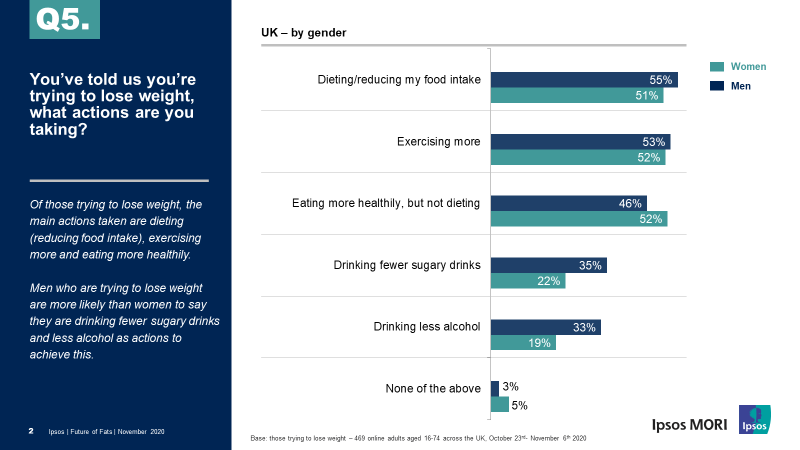More than 4 in 10 Britons are trying to lose weight, focusing on dieting and exercise
In a new global Ipsos survey, more than 4 in 10 (43%) Britons say they are trying to lose weight. Women are significantly more likely to be trying to shed the pounds; half are currently working towards this while 37% of men are trying to do the same.
When looking at methods of weight loss, dieting/reducing food intake and exercising more are most likely to be used (53% and 52% respectively). Half of British adults are eating healthier but not dieting while around a quarter are drinking fewer sugary drinks (27%) and alcohol (25%). Men are significantly more likely to cut sugary drinks and alcohol out of their diets, roughly a third use this as a method (35% sugary drinks and 33% alcohol), only around 2 in 10 women would do the same (22% and 19% respectively).
 Over half of Britons trying to lose weight say they are attempting to reduce the amount of total sugar in their diet to aid their weight loss, 47% of those who are not currently trying to lose weight believe that sugar should be reduced to help lose weight. Calorie reduction is also seen as important when trying to lose weight, almost half (47%) of those trying to lose weight believe calories should be avoided, 39% not trying to lose weight believe this is important.
Over half of Britons trying to lose weight say they are attempting to reduce the amount of total sugar in their diet to aid their weight loss, 47% of those who are not currently trying to lose weight believe that sugar should be reduced to help lose weight. Calorie reduction is also seen as important when trying to lose weight, almost half (47%) of those trying to lose weight believe calories should be avoided, 39% not trying to lose weight believe this is important.
One in five (20%) have reduced the amount of alcohol they consume while they try to lose weight, but this is seen as more important among those not trying to lose weight (24%). Only 7% say they are avoiding meat while attempting to shed the pounds.
Britons appear well informed when it comes to understanding the difference in the type of fat they should be avoiding. While over a quarter of those trying to lose weight (27%) would avoid saturated fats, only 2% would avoid unsaturated fats.
Among those trying to lose weight, cheaper healthy foods are seen as the best way companies and the government could help people with weight loss (52%). Other solutions include healthier ingredients in processed foods (17%), more public exercise facilities (14%), more green public spaces for exercising (14%) and easier access to healthy foods (9%).
Pippa Bailey, Head of Innovation at Ipsos, said:
There is evidence from this survey that a large proportion of the British population recognise the need to manage their weight and we do see that people are better informed about the factors in their diet that they need to focus on to achieve that goal. However, much relies on the individual to remain motivated and we know that there are many so factors that can easily erode that motivation. So, a multi-faceted approach which also involves manufacturers, retailers, education and policy makers is going to be needed to successfully halt and then reverse the obesity crisis.
Technical note:
- The data for this research was collected via Ipsos Global Advisor from October 23rd to November 6th, 2020. In total 22,008 interviews were conducted between October 23rd and November 6th, 2020 among adult consumers.
- The survey was conducted in 30 markets around the world via the Ipsos Online Panel system: Argentina, Australia, Belgium, Brazil, Canada, Chile, China, France, Germany, Great Britain, Hong Kong, Hungary, India, Israel, Italy, Japan, Malaysia, Mexico, Netherlands, Peru, Poland, Russia, Saudi Arabia, Singapore, South Africa, Sweden, Turkey and the United States.
- The samples in some markets (e.g., Brazil, mainland China or India) are more urban, more educated, and/or more affluent than the general population. The survey results for such markets should be viewed as reflecting the views of the more “connected” segment of their population.
- The data is weighted so each country’s sample composition best reflects the demographic profile of its adult population according to the most recent census data, and to give each country an equal weight in the total “global” sample.
- Where results do not sum to 100, this may be due to computer rounding, multiple responses or the exclusion of don't knows or not stated responses.
- UK data for Q8 were subject to individual editing decisions



